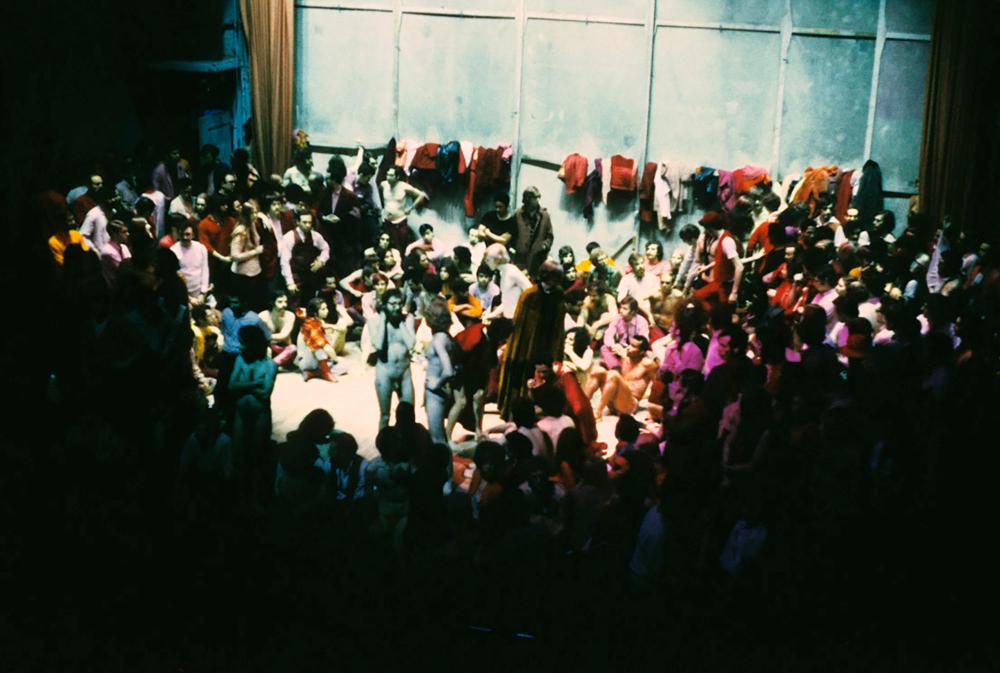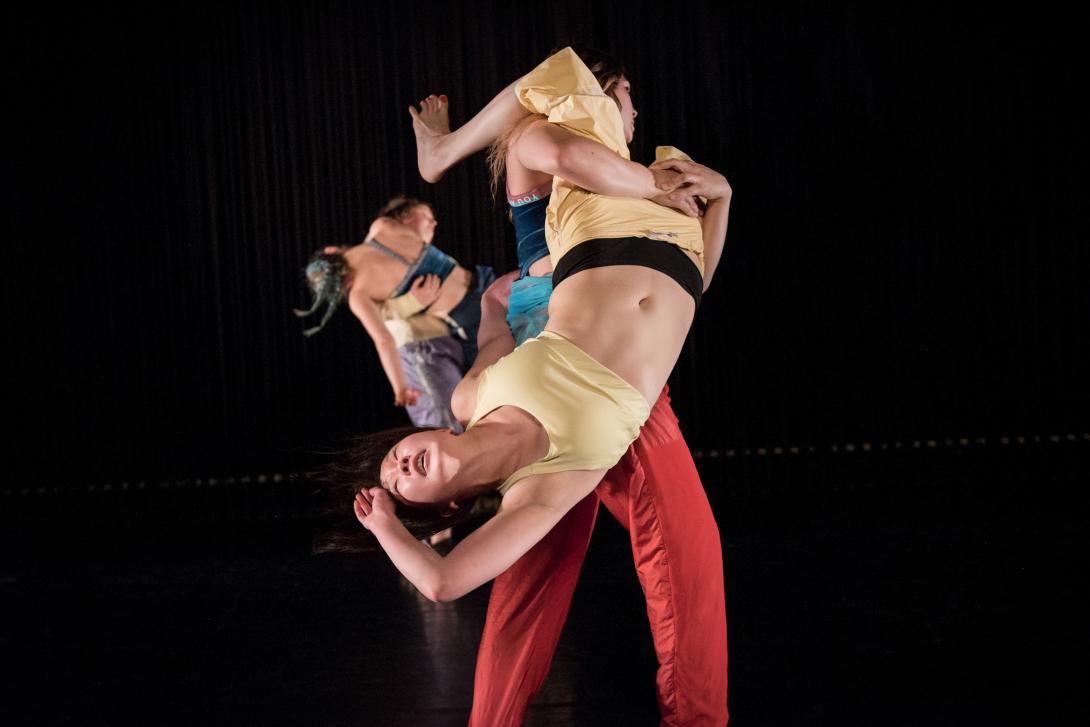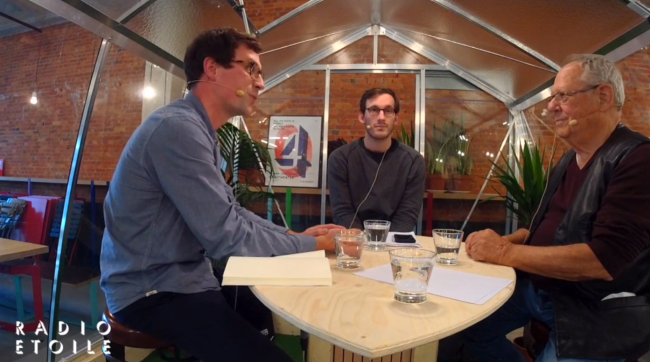PARADISE NOW (Then & Now): On Revolutionary Theatre
Michiel Vandevelde in conversation with Richard Schechner (moderated by Kristof van Baarle)
In October 2017, the founding father of performance studies Richard Schechner and choreographer, dancer and curator Michiel Vandevelde were invited to have a conversation about art, arts centres, and the world. The conversation took place during the Kaaitheater’s 40th anniversary week as part of a series of conversations entitled Radio Etoile. In a little greenhouse in the middle of the Kaaitheater café, artists, thinkers, lecturers, and journalists shared their thoughts in seven one-hour sessions.
The conversation with Schechner and Vandevelde centred on the performance Paradise Now (1968) by the American theatre collective The Living Theatre, which was founded in 1947 and is still active. Richard Schechner founded the department of performance studies at NYU Tisch School of the Arts and has deeply influenced the way we study and think about performance today, which in turn is strongly marked by his own research on rituals. He became closely involved in The Living Theatre in the sixties.
Michiel Vandevelde had just started the creation process of his new piece Paradise Now (1968-2018), which is rooted in the The Living Theatre performance from 1968. His artistic practice is very diverse, including dancing, choreographing, writing, and discursive activities, he is an artist-in-residence at Kaaitheater, and he is part of the artistic team of the Brussels festival Bâtard and the Antwerp venue Extra City. Until March of this year, he was also part of the editorial team of the performance art journal Etcetera.
Richard, what was The Living Theatre precisely? And can you share with us your viewing experience of the Living Theatre’s Paradise Now back then?
Richard Schechner: The Living Theatre began right after WWII as a “classic art theatre”, a collective lead by Judith Malina and Julian Beck. They were interested in poetry and in work by writers like Antonin Artaud and William Carlos Williams. Their first big breakthroughs were Jack Gelber’s The Connection in 1959, and The Brig by Kenneth H. Brown. The plays were staged in a hyper-realistic way and contained a social concern. In 1964, during a performance, THAT-agents raided the theatre to arrest The Living Theatre for failure to pay taxes. Those who were in the theatre – I was there myself too – had to choose whether to stay and be arrested or leave. After that, The Living Theatre left for Europe, except for a few members, like Joseph Chaikin, who started The Open Theatre. Those who left for Europe became overtly political and anarchic. They opposed any form of government. Their core ideas were the black flag of anarchy and they called it the beautiful anarchist revolution. It was in Europe that they created Paradise Now, in which they began to reject realism and the notion of narrative. The performers represented themselves and were telling the stories of their journey from enslavement to liberation, from ignorance to knowledge and from darkness to enlightenment in the spiritual sense. At the same time, they knew they could never accomplish this paradise, so it was also about the rage and frustration of not being able to be enlightened and not being able to be free. What struck me most about the performance as I recall it at that time was this rage and its intensity, combined with a hope that was always delayed.
They invited the audience to join in, which they often did. This play took place in 1968, a period of great upheaval around the world. There were the assassinations of Robert and John Kennedy and of Martin Luther King. There was the movement of the National Democratic Convention, the disruptions in Chicago, huge student demonstrations in Mexico City and in Paris. These youth movements were extremely optimistic, but also polarizing. The movements against the government were vital, active and The Living Theatre both supported them and joined them. They became a leader for them, bringing people out into the street at the end of their performances.
Michiel, you are going to work with young people in your reworking of Paradise Now. What are the stakes of your take on this piece?
MV: I encountered Paradise Now in 2012 via a video recording and I was very struck by the performativity and straightforward politicalness, which you rarely see on stage these days. At that time, I was also involved in the Indignados movement here in Brussels and the Occupy movement in London. When a theatre company asked me to do something with youngsters, I decided to work with this piece. I want to see what has happened in the fifty years between ‘68 and 2018. Back then, for example, there was a kind of hope. They could still think the future, whereas nowadays thinking the future has become almost impossible. I’m interested in how The Living Theatre worked with energy, with chakras and spirituality. How can we work with this in the creation of a new kind of performance and ‘what would be a Paradise Now for the 21st century?’. I think it would have to be something radically different, which cannot be what it was back then.
RS: I think another crucial difference is the advent of the internet and digitalization. Instead of coming into the streets, we now have increasingly global societies, in which people go on to their machines in order to make contact. And they live on these machines. Today we think of a digital commons and we have transformed and reduced the multisensorial experience, by which we can be surrounded, to a largely visual experience. The classical revolution occurred under the aegis of the proximal senses: touch, taste, smell. Sight and sound were also very important, of course, but more limited as the actions couldn’t occur at a distance. Digital actions – and we don’t yet know if a revolution is possible on these auspices – occurs structurally at a certain kind of critical distance. Our young people are much more cynical in a good sense, ironic, not ‘sincere’. The Living Theatre valued sincerity as an opposite of truth – which is verifiable by a set of standards, such as scientific or religious ones – whereas sincerity is personal. For them, the notion of this personal belief counted, rather than the public belief, of sincerity and “authenticity”, rather than political ideology.
MV: If I may contest a little bit: for a lot of people the machines you’re talking about also bring proximity. And they have made people come out on the streets, such as in the Arab Spring, but also still gather in Europe. Think of the Nuit Debout a year ago. Where I do agree is that this technology has a huge influence: it is mostly image-based and it mostly speaks to what comes before language. It speaks about affect. We are affected by something we see on our screen. But the moment we start to phrase it within language, the whole movement splits up. You get an individuation of political action.
The Living Theatre was a very physical form of community: they lived together, they propagated the community values and translated them onto the stage artistically. What is collectivism today and what role does it play in their performances?
MV: Communities in Brussels today are no longer assembled by ideology, as they were in the sixties, but political action does still take place, mostly for very concrete problems. So it is not about the ‘whole’ anymore, but about specific issues. Activism nowadays is very concerned with jurisdiction. You look at the precise rules and to what extent they can be bent and stretched. The Charter for Stage Artists, for example, focuses on a very specific problem, namely the fact that artists are often unfairly paid for the work they do in existing institutions. But the charter doesn’t do anything other than reaffirm what has already been legally put in place.
RS: Instead of the class revolution of the sixties, we’re now talking about redistribution of wealth: how transnational corporations rather than individuals suck up the profit of the labour force and it remains in relatively few hands. And there is the question of increasing automation. Labour is increasingly being replaced by automated systems. Today the money saved goes to the corporations, the robot owners. But one might also say that the money saved should be redistributed to the people who were former workers, as a guaranteed annual income. This logic distinguishes labour – what you do and get paid for – from work, like artistic work. But we don’t want the people who are guaranteed an automatic income simply to sit in front of their television screens all day. If they were to do real work, be it artistic or social, as distinct from labour, would that be a ‘paradise now’?
Michiel, how are you going to use the Paradise Now material to build your new performance? How are you going to involve what is at stake in the world today?
MV: I have only been rehearsing for two weeks now, but what I find interesting in the original Paradise Now is the movement from in to out. The audience was clearly sitting in the traditional position, but they were constantly dragged in or tried to become part of the performance. I want to maintain this movement. I’m also interested in exploring the meaning of spiritual practices in the 21st century with these young people, perhaps by inventing new ones. We will use our imaginations and maybe even invent a utopic way of living together – who knows? Thirdly, I want to think about the intimacy between these young bodies. We live in a strange time in which, on the one hand, we see an extreme conservatism in how we deal with our bodies in the public space. But on the other hand, we see the hyper-sexualisation of advertising campaigns. We’ve already worked on this conservatism, the way we approach each other and deal with our bodies, by breaking boundaries between bodies. And in that sense, it connects to what The Living Theatre was also doing: really becoming part of each other. Of course, The Living Theatre failed in all these enterprises, but I think this failure is exactly what makes it so interesting.


